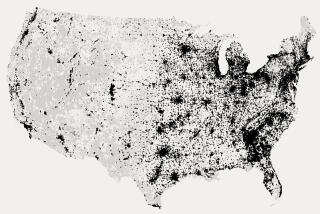ATF ‘Beaten Down’ on Gun Control, Official Says : Law enforcement: Aide to Treasury secretary describes veteran bureau employees as reluctant to curb spread of weapons. Lawsuits are feared.
- Share via
WASHINGTON — The Treasury Department’s top law enforcement official Thursday described the difficulty he has had trying to persuade longtime employees that tougher steps could be taken to stop the proliferation of guns in America.
“Years and years of not being able to fight this issue have beaten down” the Treasury Department’s Bureau of Alcohol, Tobacco and Firearms, Ronald K. Noble, assistant secretary of the Treasury for enforcement, said at a meeting of The Times’ editors and reporters.
“I don’t want to point a finger at other administrations, but there’s a mentality in ATF that ‘we can’t do this,’ ” Noble said. As an example, he said ATF officials had been reluctant to confront legal challenges the department might face if it refused to issue federal firearms licenses to dealers who plan to operate in areas where local authorities have banned weapons sales.
“Why can’t we say ‘no?’ ” Noble said he asked the officials. “By saying ‘yes,’ aren’t we an accomplice to a crime? So, why don’t we just say ‘no,’ and if they take us to court, let them take us to court.”
Noble’s comments came against the backdrop of an ambitious program announced this week under which Treasury--and what he regards as a revitalized ATF--would impose a 10-fold increase in fees dealers pay for federal licenses. The purpose is to reduce licensees, who now number 284,000 nationwide, by 80%. The program also would computerize millions of existing sales records for tracing guns and for other purposes, and step up background checks on dealer applicants.
Prominent among the steps is requiring federal licensees to obey state and local gun laws, thus ending the practice of issuing federal licenses to dealers in areas where local laws forbid gun sales.
Noble explained that the department wants to weed out hundreds of thousands of dealers who buy their licenses solely so they can obtain weapons for their own use at wholesale prices, with no intention of engaging in retail sales. The purpose is to ease the workload on the ATF’s 240 inspectors, who are so overburdened they cannot fully enforce federal requirements that dealers maintain records for use in tracing weapons.
Last year, for example, some 17.2% of the 54,000 requests for ATF tracing could not be completed “because a federal firearms licensed dealer went out of business, never was in business, wasn’t home, didn’t keep records, lost records, and so forth,” Noble said. Now, ATF is trying to conduct “some kind of background check in the nation’s high crime areas,” and Noble cited with approval a program conducted with the New York Police Department over the last five months.
*
Under that program, face-to-face interviews were done with 227 applicants for federal firearms licenses, during which they were informed about the requirements for selling firearms in the city. Some 213 withdrew their applications, and another three were denied, according to Noble.
In a related development Thursday, the General Services Administration said it will no longer permit federal agencies to sell their used firearms to private gun dealers. The GSA, the government’s housekeeping agency, said it hopes the new limitation will curtail the flow of handguns into the streets.
More to Read
Sign up for Essential California
The most important California stories and recommendations in your inbox every morning.
You may occasionally receive promotional content from the Los Angeles Times.













